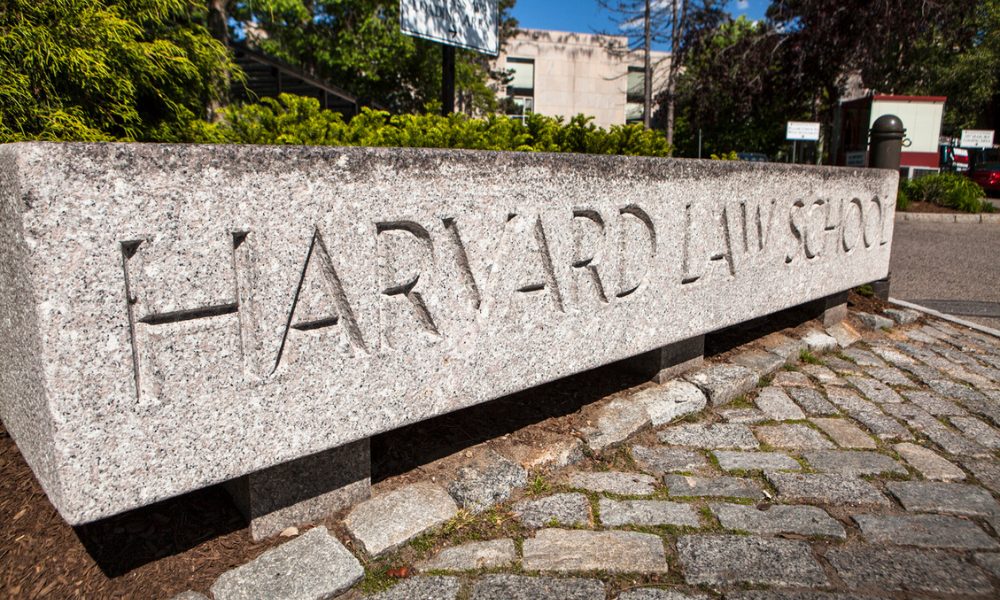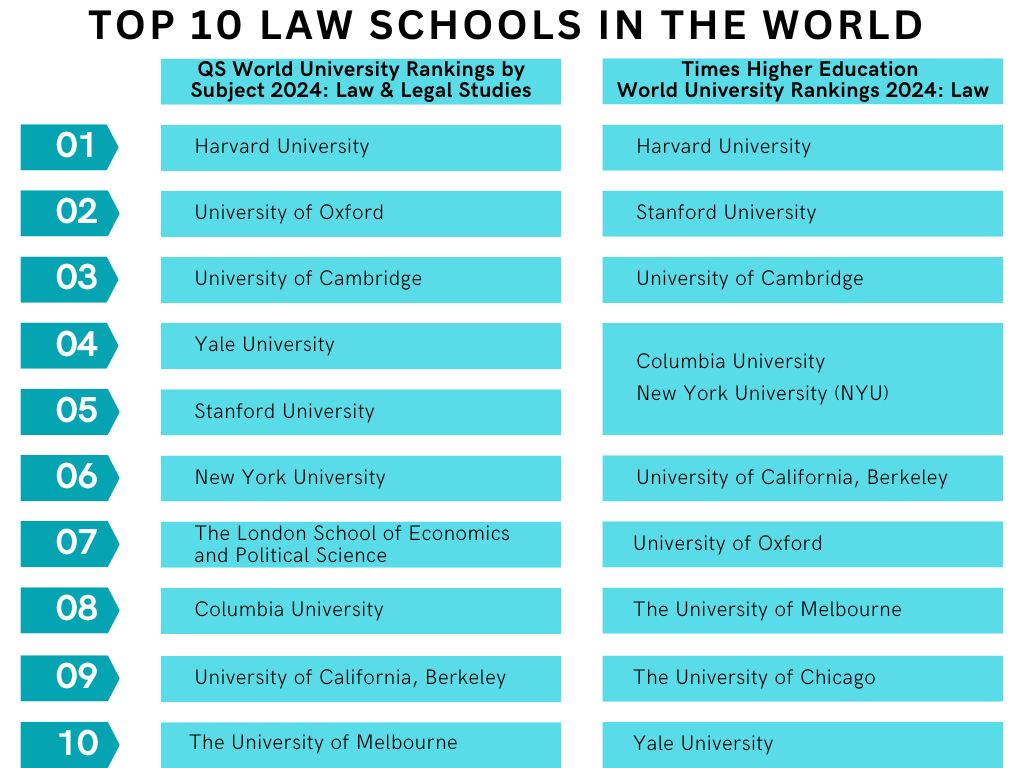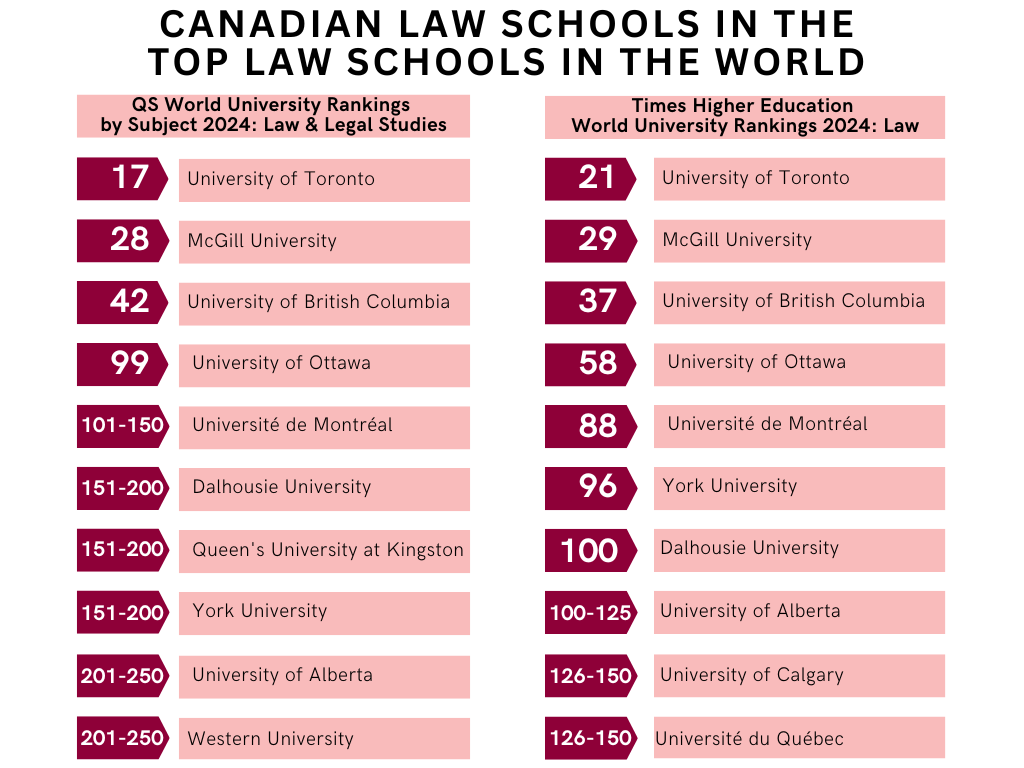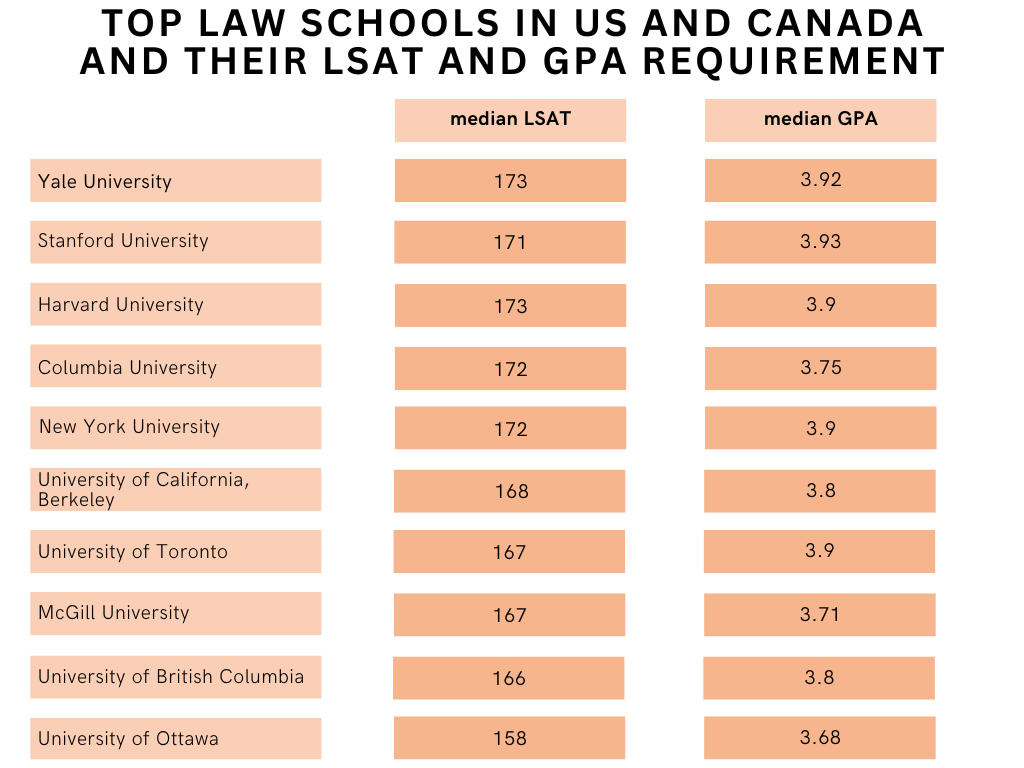
Know the top law schools in the world and the Canadian law schools that made it to the list, including some tips on how to get into these schools

When you’re looking where to study law, your first search may be what are the top law schools in the world and what are their requirements for admissions. If you’re shooting for the stars, then this article is for you.
As a future law student, it’s important to know how to treat rankings, surveys, and listings from different sources. It’s also wise, as early as now, to know how to filter these wide arrays of options that will best suit you and your future studies.
The world’s best law schools can be measured by different standards and metrics. It can be based on how they’re ranked by trusted institutions or by their accomplishments and admission requirements, among others.
When looking for the leading law schools, look at their rankings. There are different entities that do these surveys and release their results every year.
Here are the top-ranking law schools in the world according to two different sources:

As you can see, the top law schools can have different rankings in different surveys. However, they are consistent when it comes to being placed in the top 10 of these rankings.
When searching for rankings about the top law schools, you may want to check their methodology on how they arrived at such rankings.
For instance, the Quacquarelli Symonds (QS) World University Rankings, which has other rankings based on areas of education, uses the following metrics for law schools:
On the other hand, the Times Higher Education’s World University Rankings 2024 uses a different methodology for law school rankings. Below are their metrics when ranking law schools over the world:
This video explains why these rankings matter for universities around the globe, including law schools:
Read our Global Best in Law report for a listing of the world’s top lawyers and law firms.
Rankings of the top law schools differ in every region and country. These filters can help you when these top-ranking law schools are out of your possible options, or if you’re looking for alternatives that are still the best in the field of law.
Using the same sources, here are the Canadian law schools that made it to the list of the top law schools in the world:

Even though Canadian law schools were not part of the world’s top 10, they still made it to our guide to good law schools in Canada. They might not be part of these world rankings, but they are among the best when viewed in the context of their own country.
Here’s a video that shows the top law schools per continent:
Head over to our report on Canadian law schools for more on the institutions that were named among the best law schools in the world.
Related to the admissions process of each law school are the admission rates, which tell you what each applicant’s chances are of getting into that law school. While all law schools have similar admissions requirements and procedures, how they look at each requirement would depend on the school.
To get a picture of their admission rates, here are the top law schools in the US and in Canada ranked according to the LSAT score and GPA they’re accepting for admission:

You’ll have to check with your law school of choice if they set a minimum LSAT and GPA. For instance, most Canadian law schools say that, although it’s required, their LSAT and GPA metrics are just a statistic on their successful yearly applicants. This means that it’s not really a fixed score that applicants must reach to be admitted; those with lower LSAT or GPA are still encouraged to apply.
There are ways to help you overcome a particular law school’s low admission rate.
Initially, you can check your preferred law school’s own admissions policy. In that policy, you can find out how your law school will consider what you’re required to submit. It can also give you an idea of how lenient that law school is when it comes to certain requirements (e.g., low LSAT score).
For example, the admissions policy of McGill University – Faculty of Law says that it wants to attract a mix of candidates and dismantle the “systemic barriers to legal education.” McGill has these admissions policies and guidelines:
This is just an example of a law school’s admission guidelines. Check with your preferred law school for their own policies.
The top law schools in the world have the strictest admissions processes and requirements. Here are some general admissions requirements:
Law schools in North America require:
Preferring a high LSAT score and GPA is what distinguishes these top law schools from the others.
A high standard for admission is also equivalent to higher chances of passing the bar exams. Schools with stricter admission processes have larger numbers of bar exam passers. Although there are other factors to consider when putting a number on these passing rates vis-a-vis their admission process.
The Law School Admission Test (LSAT) is still one of the important law school requirements used by most law schools in North America. Although there are some schools that will treat your LSAT score/s as optional in their admissions process, it’s undeniable that it will improve your chances of getting admitted.
Law schools, especially those in Canada, do not fix a minimum LSAT score for admission. Instead, they release the average LSAT scores of the students that they accepted during the past years. Example, University of Toronto’s Faculty of Law released the following data of its 1L JD class for the academic year 2023-2024:
|
Applicants |
2281 |
|
Class size |
214 |
|
LSAT |
25% of the class has a score of 164 or below |
|
|
median is 167 |
|
|
75% of class has a score of 170 or above |
|
GPA |
25% of the class has a GPA of 3.83 or below |
|
|
median is 3.9 |
|
|
75% of class has a GPA of 3.95 or above |
The top law schools can also be measured by the highest LSAT scores that they accept; the higher the LSAT scores, the more difficult it is to get into that law school.
Know how to prepare for your LSAT and aim on getting a high score. You can also compensate for low LSAT scores by improving other aspects of your admission requirements (e.g., higher GPA or writing a good personal statement).
Getting into the top law schools in the world can be a moonshot to some, but it’s not bad to reach for the stars when it comes to your legal education.
Don’t be disheartened if your law school of choice is not among these top-ranking law schools. In the legal profession, what’s important is that you complete your legal education and that you get called to the bar. Remember, your drive and commitment will determine your path in the legal world, regardless of where you begin.
For more details on Canadian institutions that are among top law schools in the world, go to our Legal Education page.